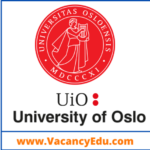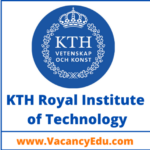Wageningen University & Research, Netherlands invites online Application for number of Fully Funded PhD Degree at various Departments. We are providing a list of Fully Funded PhD Programs available at Wageningen University & Research, Netherlands.
Eligible candidate may Apply as soon as possible.
(01) PhD Degree – Fully Funded
PhD position summary/title: PhD position – Rapid Experimentation and Data-driven Ingredient Characterization & product Testing
We are seeking a PhD candidate to drive the transformation of food product development through the integration of high-throughput experimentation (HTE), data science, and food processing. The project, as a part of the PREDICT project, aims to accelerate the shift toward sustainable and climate-friendly food products by replacing traditional trial-and-error methods with predictive, data-driven approaches.
Current food product development struggles to handle the complexity of new, sustainable ingredients. This project will address that challenge by developing automated high-throughput methods to assess ingredient techno-functionality and product properties. You will work with developing HTE-based methods to characterize functional properties of complex food ingredients. The project plans to collect large-scale experimental datasets and apply machine learning techniques to predict the performance of complex food ingredients, supporting the creation of products with lower environmental footprints and enhanced functionality.
Deadline : 14 July 2025
(02) PhD Degree – Fully Funded
PhD position summary/title: PhD position in precision nutrition and human metabolism
We are looking for a highly motivated and enthusiastic PhD candidate to work with us on precision nutrition and human metabolism research.
Increasing evidence shows that individuals respond very differently to foods, meals, and diets, but the biological mechanisms driving this variation remain largely unknown. Post-meal glucose and lipid responses are short-term markers of how individuals respond to nutrition.
In this project, we will conduct human dietary intervention trials to study these post-meal responses to complex meals under controlled conditions. We aim to gain novel insights into both intra- and inter-individual differences in these metabolic responses. In addition, we will study how the timing of meals affects these acute responses, including the variability between and within individuals.
The data collected in these trials will feed into the development of the Human Dietary Digital Twin—a computational model for the prediction of individual metabolic responses to complex meals. This modeling work will be carried out by a PhD candidate at the Technical University of Eindhoven. The project is part of a larger public-private partnership funded by TKI and private partners.
Deadline : 30 June 2025
View All Fully Funded PhD Positions Click Here
(03) PhD Degree – Fully Funded
PhD position summary/title: PhD student position: Small pelagic fish in offshore windfarms – NO-REGRETS project
The Aquaculture and Fisheries group (AFI) and Wageningen Marine Research (WMR) at Wageningen University and Research are looking for a PhD student to join them in the NO-REGRETS project that aims to study the ecological effects of offshore windfarms (OWFs) in the North Sea. The project is a collaboration among several research institutes and universities, including the Royal Netherlands Institute for Sea Research, Naturalis, the University of Amsterdam, and Wageningen University and Research. Other collaborations will involve a broad range of stakeholders in the North Sea area, including NGO’s and fisheries organisations.
You will focus on small pelagic fish (SPF) such as herring, sprat and anchovy in and around offshore windfarms in the North Sea. These offshore wind farms introduce artificial hard substrates to a mainly soft-sediment environment, leading to hard substrate benthic communities growing on the monopiles and scour protection. These communities consume organic and inorganic matter from the water, including the eggs and juvenile stages of small pelagic fish, potentially reducing their productivity. Moreover, competition for food caused by overlaps in diets between the grazing benthic community and the juveniles and adults of SPF may further affect productivity.
Vice versa, the pelagic eggs and larvae of benthic communities on hard substrates may serve as food for the small pelagic fish community for juvenile and adult life stages, resulting in increased growth of small pelagic fish and thus increased production. These opposing forces in the changes of food availability, competition though food overlap and predation for SPF around OWFs lead to potential changes in habitat use of small pelagic fish. Meanwhile, there is no knowledge on small pelagic fish diet around OWFs, food overlap, and potential competition. In addition, the monopiles and scour protection on the seafloor also attract larger pelagic predatory fish such as mackerel and cod.
Deadline : 23 June 2025
(04) PhD Degree – Fully Funded
PhD position summary/title: PhD position: Offshore wind farms biofouling & plankton interactions
Your research will focus on the benthic community food web and investigate the interaction of OWFs biofouling communities and plankton in the North Sea. The development of OWFs introduces significant amounts of artificial hard substrates, into environments that mostly consist of soft sediments. These structures create surfaces for marine fouling communities to establish, attracting a variety of epifauna species.
The introduction of OWFs also changes local food webs. The shift in species composition and the way organic matter is processed alters ecosystem dynamics. Most of the organisms that attach to these structures feed by filtering particles from the water, including phytoplankton and zooplankton. This could alter primary productivity and change the settlement of planktonic larvae. By removing organic and inorganic materials from the water, these communities influence the functioning of the seabed ecosystem. Filter feeders may compete with pelagic grazers such as copepods and juvenile fish, which rely on the same zooplankton for food. Little is known about the extent of this overlap or the broader, long-term effects.
Deadline : 23 June 2025
(05) PhD Degree – Fully Funded
PhD position summary/title: PhD – A future-oriented assessment programme in VET: supporting the learning and decision-making function of assessment programmes
As a PhD you will be involved in a 4 year NRO (Nederlands Regieorgaan Onderwijsonderzoek) funded project that is contextualised in the Learning network “Lerend Kwalificeren” (LK-network) in Vocational Education and Training. This network is supported by researchers (dr. Judith Gulikers & Dr. Liesbeth Baartman and the VET-council (Kennispunt Onderwijs & Examinering). In the LK-network VET teacher teams design, implement and evaluate new assessment programmes, building on the principles of Programmatic Assessment and intended to foster and stimulate both learning (formative) and decision making (summative). This PhD project studies how formative assessment and feedback can be optimally used in these assessment programmes to support both the learning and decision-making function of assessment. This is a participatory research project, in which the PhD works together with VET teacher teams in monitoring their assessment programmes and professionalising all involved partners (i.e. students, teachers, workplace assessors).
Deadline : 15 June 2025
Polite Follow-Up Email to Professor : When and How You should Write
Click here to know “How to write a Postdoc Job Application or Email”
(06) PhD Degree – Fully Funded
PhD position summary/title: PhD student: Transforming Governance for Nature-Based Water Solutions
As climate change worsens droughts and water risks, sustainable, adaptive water management is more urgent than ever. Nature-based solutions (NBS), which use natural processes like forests, wetlands, and soils, offer alternatives to traditional grey infrastructure. NBS can help manage water whilst providing co-benefits such as biodiversity enhancement, carbon storage, and improved human well-being. However, despite their potential, implementing NBS remains challenging. Governance issues like fragmented responsibilities, legal uncertainties, and perceptions of risk and professional practice are persistent challenges. Additionally, each local context brings its own social, ecological, and institutional complexities, making it difficult to scale up successful examples. In this context, we seek to understand how NBS can be adopted, adapted, and sustained over time. Answers might lie in examining who is involved in decision-making, how competing interests are negotiated, and what institutional arrangements support or hinder NBS implementation.
This PhD project explores institutional, social, and political factors shaping NBS uptake across Europe. It will contribute to a deeper understanding of how these approaches can be more effectively integrated into climate-resilient water management and how they might transform how we manage and relate to water. By investigating barriers, mapping stakeholder dynamics, and identifying leverage points, the project will help inform more inclusive and effective governance strategies for nature-based adaptation.
We seek a highly motivated PhD candidate to join the EU HORIZON project WATERGRID, an international collaboration demonstrating nature-based solutions for climate-resilient water management, focusing on drought. The project brings together 22 partners from diverse disciplines and sites across Europe, including the UK, Portugal, and Spain. WATERGRID will develop, test, and implement various nature-based solutions while exploring the economic, institutional, and governance conditions that enable their uptake across different environmental and political contexts.
Deadline : 30 June 2025
(07) PhD Degree – Fully Funded
PhD position summary/title: PhD position Modeling of individual plant stress responses across species
With a budget of 96 million euros over a period of ten years, CropXR focuses on creating eXtra Resilient (XR), sustainable, and climate-adaptive crops. By combining plant biology, simulation modelling, and artificial intelligence we aim to develop smart breeding and cultivation methods. Thus, we try to speed up the breeding of complex resilience traits for several crops in different growing systems. This collaborative effort involves four universities and numerous companies. It encompasses scientific research, data collection and sharing, education, and practical applications in agriculture and plant breeding. Learn more about CropXR at here.
This vacancy is for two PhD positions that are part of the Translator work package within the core research program of CropXR. Our goal is to develop computational methods to translate integrated simulation models of plant responses to stress (drought, heat) from a model plant species (Arabidopsis thaliana) to a number of relevant annual crop species. This highly interdisciplinary and collaborative work package brings together experimentalists, providing measurement data for translation and testing model predictions; bioinformaticians, investigating evolutionary conservation of sequence, (co)expression and regulatory modules; and modelers, developing crop-specific integrated plant models.
In this work package, two PhD candidates (one at Wageningen University, one at Utrecht University) will focus on complementary modelling objectives. The candidates will partly work together. Data produced by other research teams within the work package will be available for model design and parameterization.
The PhD candidate at Wageningen University will quantify and analyse to which extent stress effects on shoot and root phenotype, as quantified for Arabidopsis, can be translated to crop species. This will allow us to analyze which crop traits and responses are relevant for crop productivity under stress. You will develop a model that simulates shoot and root development and growth. This model will simulate plant growth based on carbon availability and demand by growing organs, driven by light interception leaves, nitrogen and water uptake and transport, and temperature. This approach will result in a model that can predict plant performance for the different crop species under a range of (stress) conditions, which allows to identify traits relevant to resilience.
Deadline : 16 June 2025
About Wageningen University & Research, Netherlands – Official Website
Wageningen University & Research is a public university in Wageningen, Netherlands, specializing in technical and engineering subjects and an important center for life sciences and agricultural research. It is located in a region of the Netherlands known as the Food Valley.
WUR consists of Wageningen University and the former agricultural research institute of the Dutch Ministry of Agriculture. Wageningen University trains specialists (BSc, MSc and PhD) in life and social sciences and focuses its research on scientific, social and commercial problems in the field of life sciences and natural resources. It is widely known for its agriculture, forestry, and environmental studies programs. The university has about 12,000 students from over 100 countries. It is also a member of the Euroleague for Life Sciences (ELLS) university network.
WUR has been placed among the top 150 universities in the world by four major ranking tables. Wageningen has been voted the number one university in the Netherlands for fifteen consecutive years. The university is listed number 59 in the world by the Times Higher Education Ranking and the world’s best in agriculture and forestry by the QS World University Rankings 2016–2020.Wageningen University is ranked number one in the fields of plant/animal science, environment/ecology, and agricultural sciences by U.S. News & World Report. The university is widely regarded as the world’s top agricultural research institution.
Disclaimer: We try to ensure that the information we post on VacancyEdu.com is accurate. However, despite our best efforts, some of the content may contain errors. You can trust us, but please conduct your own checks too.
Related Posts
- 24 PhD Positions-Fully Funded at Delft University of Technology (TU Delft), Netherlands

- 07 PhD Positions-Fully Funded at University of Antwerp, Belgium

- 04 PhD Positions-Fully Funded at Paul Scherrer Institute (PSI), Switzerland

- 13 PhD Positions-Fully Funded at NTNU, Norway

- 06 PhD Positions-Fully Funded at Aalto University, Finland

- 30 PhD Positions-Fully Funded at ETH Zurich, Switzerland

- PhD Positions (08)-Fully Funded at University of Oslo, Norway

- PhD Positions (16)-Fully Funded at KTH Royal Institute of Technology, Stockholm, Sweden

- PhD Positions (15)-Fully Funded at Utrecht University, Netherlands











